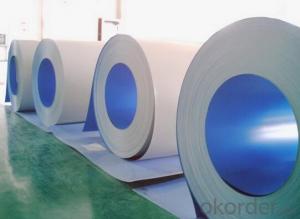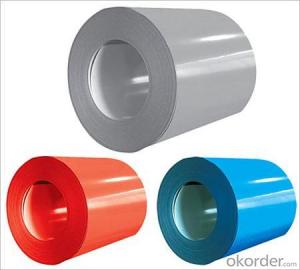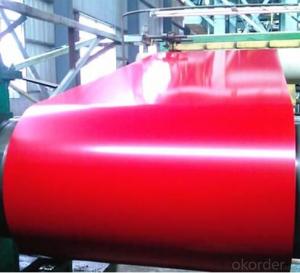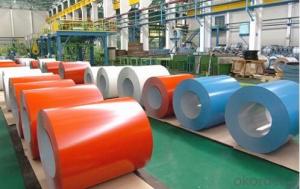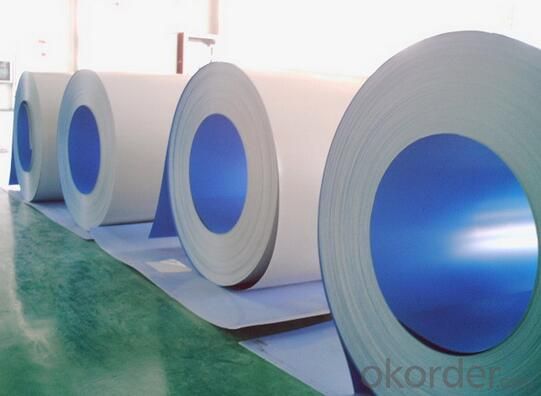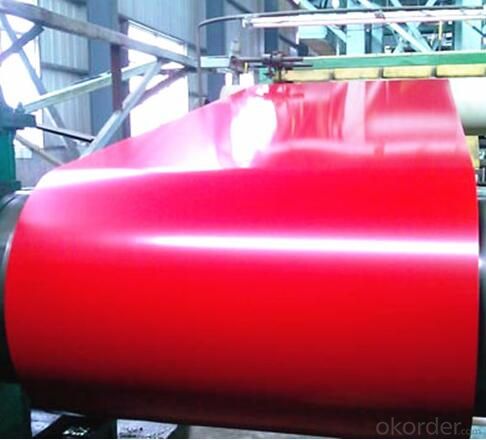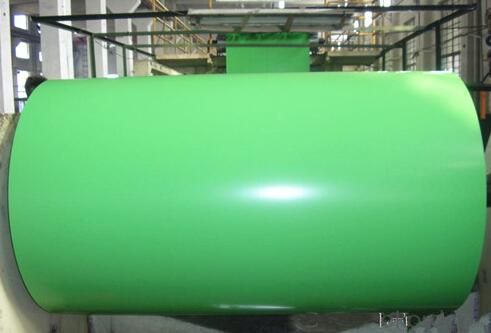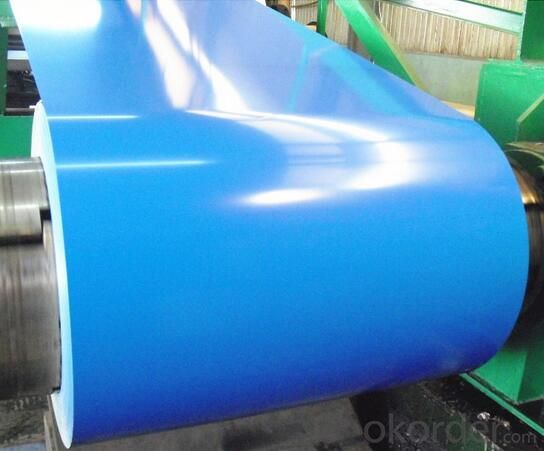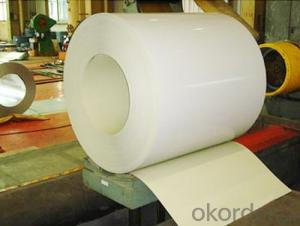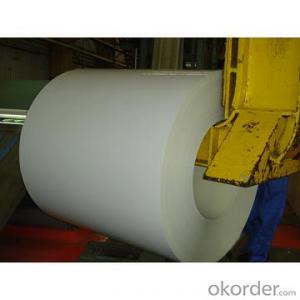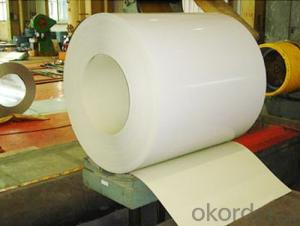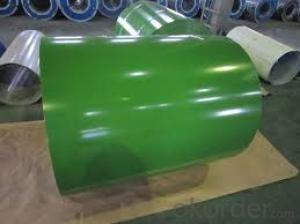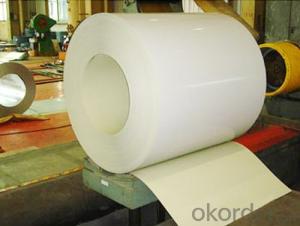PPGI Coils Color Coated Steel Coil RAL9002 White
- Loading Port:
- Tianjin
- Payment Terms:
- TT or LC
- Min Order Qty:
- 30 m.t.
- Supply Capability:
- 10000 m.t./month
OKorder Service Pledge
OKorder Financial Service
You Might Also Like
Specification
PPGI Coils Color Coated Steel Coil RAL9002 White
Details of PPGI Coils Color Coated Steel Coil RAL9002 White
Grade | DX51D, SGCC, CGCC |
Thickness | 0.15mm-1.5mm |
Width | 600mm-1500mm(914/1219/1250 are available) |
Standard | JIS G3312, ASTM,GB/T1275 |
Certificate | ISO9001.ISO14001.OHSAS18001 |
Length | As per requests |
Zinc Coating | 40g-275g/m2 |
Lacquer Coated | 20-25 microns/5-15 microns |
Coil ID | 508mm/610mm |
Coil Weight | normally 3-10mt or as your requirement |
Supply ability | 200,000Mt/year (MOQ:25Mt) |
Color | RAL No. |
Price terms | FOB,CFR,CIF |
Payment terms | L/C,T/T |
Deliver time | 30days after received deposit or L/C |
Packing | Standard exporting package |
steel strip Water proof paper, metal covers, | |
Application | Corrugated roofing,outside building, |
boating building,car producing | |
household appliance | |
Main market | Southeast Asia , the EU, Russia, Ukraine , Latin America and other countries and Regions |
Specification of PPGI Coils Color Coated Steel Coil RAL9002 White
Thickness | Width | Length of plate | Inner diameter of coil |
0.18-1.2mm | 800/914/1000/1200/1219/1250mm | 1000-6000mm | 508mm/610mm |
Coated Mass: | |||
Available Coated Mass(g/m^2) | Base plate | Available Coated Mass(g/m^2) | |
60,80, 100, 120, 160, 180 | Galvanized Steel | 60,80, 100, 120, 160, 180 | |
50, 70, 150 | Galvalume Steel | 50, 70, 150 |
Painting | Item | Code | |
Polyester | PE | ||
High-durability polyester | HDP | ||
Silicon modified polyesters | SMP | ||
Polyvinylidene fluoride | PVDF | ||
Easy-Cleaning | — | ||
Painting Thickness | Top side: 20±5microns; | ||
Bottom side: 5~7microns. | |||
Color System | Produce according to RAL Color System or as per buyer’s color sample. | ||
Painting structure | Top surface | Bottom surface |
|
Primer coating | No coating | 1/0 | |
Primer coating | Primer coating | 1/1 | |
Primer coating + Finish coating | No coating | 2/0 | |
Primer coating + Finish coating | Primer coating or single back coating | 2/1 | |
Primer coating + Finish coatin | Primer coating + Finish back coating | 2/2 | |
CNBM Introduction of PPGI Coils Color Coated Steel Coil RAL9002 White
CNBM International Corporation is the most import and export platform of CNBM group(China National Building Material Group Corporation) ,which is a state-owned enterprise, ranked in 270th of Fortune Global 500 in 2015.
With its advantages, CNBM International are mainly concentrate on Cement, Glass, Iron and Steel, Ceramics industries and devotes herself for supplying high quality series of refractories as well as technical consultancies and logistics solution.
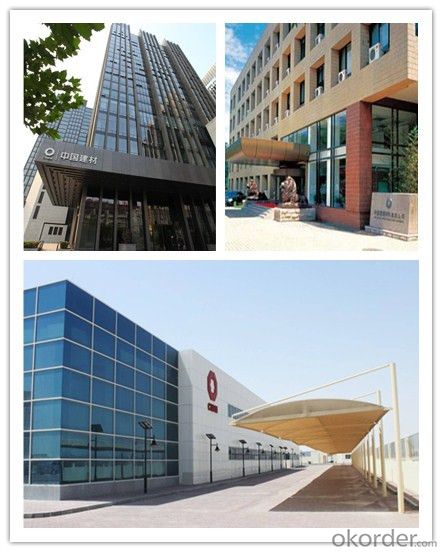
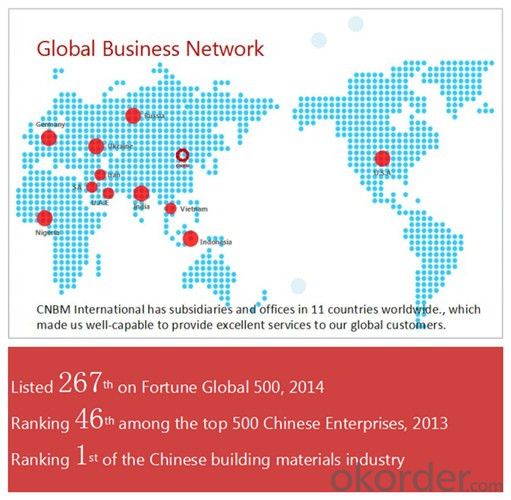
Packaging & Delivery of PPGI Coils Color Coated Steel Coil RAL9002 White
Packaging Detail | Sea worthy packing /as per customer's packing instruction |
Delivery Detail | 15 ~ 40 days after receiving the deposit |
Products Show
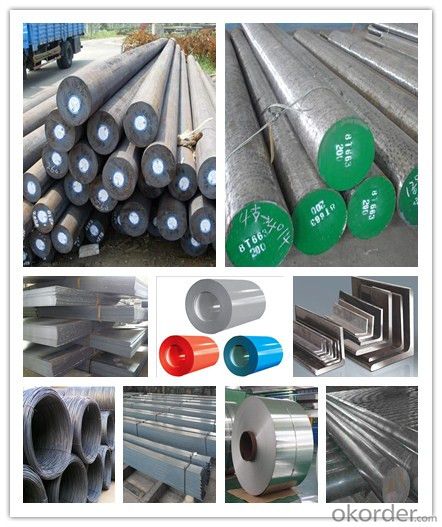
FAQ:
Are you a trading company or manufacturer? | Manufacturer |
What’s the MOQ? | 3 metric ton |
What’s your delivery time? | 15-35 days after downpayment received |
Do you Accept OEM service? | Yes |
what’s your delivery terms? | FOB/CFR/CIF |
What's the Payment Terms? | 30% as deposit,70% before shipment by T/T |
Western Union acceptable for small amount. | |
L/C acceptable for large amount. | |
Scrow ,Paybal,Alipay are also ok | |
Why choose us? | Chose happens because of quality, then price, We can give you both. Additionally, we can also offer professional products inquiry, products knowledge train (for agents), smooth goods delivery, excellent customer solution proposals. |
What's your available port of Shipment? | Main Port, China |
What’s your featured services? | Our service formula: good quality+ good price+ good service=customer's trust
|
Where are your Market? | Covering more than 160 countries in the world |
- Q: How does special steel contribute to the performance of cutting tools?
- The performance of cutting tools is greatly enhanced by special steel, which possesses a variety of advantageous properties. To begin with, the utilization of special steel in the manufacturing of cutting tools offers remarkable hardness. This hardness enables the tool to endure high levels of stress and wear, ensuring that the cutting edge remains sharp for an extended period. As a result, cutting efficiency and precision are improved. Furthermore, special steel is renowned for its outstanding toughness and resistance to chipping and breaking. This characteristic is crucial in cutting tools as it allows them to withstand the powerful forces and vibrations generated during the cutting process. The toughness of special steel ensures that the tool can withstand these extreme conditions without compromising its performance or structural integrity. Moreover, special steel provides excellent resistance to heat and temperature stability. When engaged in cutting operations, the tool can generate substantial amounts of heat due to friction. Special steel's capacity to resist thermal deformation and maintain its hardness at high temperatures prevents the cutting edge from losing its effectiveness or becoming dull. Additionally, special steel can be customized to suit specific applications through alloying and heat treatment procedures. This adaptability allows manufacturers to optimize the steel's properties based on the intended use of the cutting tool, such as cutting different materials or operating in challenging environments. By tailoring the special steel, cutting tools can be designed to provide optimal performance, durability, and longevity. In conclusion, special steel significantly contributes to the performance of cutting tools by offering exceptional hardness, toughness, heat resistance, and customization options. These properties guarantee that cutting tools remain sharp, durable, and efficient, enabling them to achieve precise cuts and endure demanding cutting operations.
- Q: How is shock-resistant steel used in the production of impact tools?
- Shock-resistant steel is used in the production of impact tools to enhance their durability and resistance to breaking or chipping under high impact forces. This steel has been specifically designed to absorb and distribute the energy created by the impact, thereby preventing any damage or deformation to the tool. By using shock-resistant steel, impact tools can withstand heavy usage and deliver consistent performance, making them ideal for applications where repeated high-force impacts are involved, such as construction, automotive, or manufacturing industries.
- Q: What are the machining techniques for special steel?
- Some of the machining techniques for special steel include turning, milling, drilling, grinding, and broaching. These techniques are used to shape and form the steel into the desired dimensions and features, while also ensuring a smooth surface finish. Additionally, special steel may require specific cooling and lubrication methods during machining to minimize heat damage and maximize tool life.
- Q: How is bearing steel used in the manufacturing of bearings?
- Bearing steel is a specialized type of steel that is used in the manufacturing of bearings to ensure high performance and durability. It is specifically designed to have excellent hardness, wear resistance, and fatigue strength. Bearing steel is used to produce the inner and outer rings, as well as the rolling elements and cages of bearings. By using bearing steel, manufacturers can produce bearings that can withstand heavy loads, high speeds, and continuous rotation, ensuring smooth operation and longer lifespan of the bearings.
- Q: What are the different forging techniques for special steel?
- There are several different forging techniques used for special steel, including open die forging, closed die forging, and ring rolling. Open die forging involves shaping the steel between flat dies or anvils, while closed die forging uses shaped dies to compress the steel into the desired shape. Ring rolling involves shaping the steel by rolling it between two or more dies, creating a seamless ring shape. Each forging technique has its own advantages and is chosen based on the specific requirements of the steel product being produced.
- Q: What are the different methods of surface polishing for special steel?
- Different methods can be used to polish special steel surfaces, each offering its own advantages and applications. These methods include mechanical polishing, electrochemical polishing, chemical polishing, electropolishing, and vibratory polishing. Mechanical polishing utilizes abrasive materials to eliminate surface imperfections and create a smooth and reflective surface. This can be done manually or with automated polishing machines. It is effective for removing scratches, dents, and other defects. Industries such as automotive, aerospace, and precision engineering commonly employ this method. Electrochemical polishing, also known as electrolytic polishing, involves using an electrolyte solution and electric current to dissolve and eliminate surface material. It is particularly useful for complex shapes and hard-to-reach areas, providing a high level of surface smoothness. This method is frequently used in industries like medical devices, semiconductors, and jewelry manufacturing. Chemical polishing selectively removes surface material and creates a smooth finish using chemical solutions. It is effective for eliminating oxide layers, stains, and contaminants. This method is often used for stainless steel and other corrosion-resistant alloys. The process involves immersing the steel in a chemical bath and controlling factors like temperature, concentration, and time. Electropolishing combines the benefits of electrochemical and chemical polishing. It applies an electric current to remove surface material while dissolving it in an electrolyte solution. Electropolishing produces a highly smooth, clean, and corrosion-resistant surface finish. It is commonly used in industries such as pharmaceuticals, food processing, and semiconductor manufacturing. Vibratory polishing utilizes vibrating media and a polishing compound to remove surface imperfections. Steel parts are placed in a vibratory tumbler or bowl, where continuous movement causes the media to rub against the parts, resulting in a polished surface. This method is commonly used for small or delicate parts and can be a cost-effective and efficient option. When choosing a surface polishing method for special steel, factors such as desired surface finish, part geometry, material properties, and industry requirements should be considered. Consulting with experts or specialists is important to determine the most suitable method for a specific application.
- Q: What is the cost of special steel compared to other materials?
- The cost of special steel compared to other materials can vary depending on a range of factors. Special steel, also known as alloy steel or tool steel, is typically more expensive than regular carbon steel due to its enhanced properties and composition. Its high strength, durability, and resistance to wear and corrosion make it suitable for specialized applications in industries such as automotive, aerospace, and construction. Compared to non-ferrous metals like aluminum or copper, special steel often comes at a lower cost. However, it is important to consider that different types of special steel can have varying price points. For instance, stainless steel, which contains chromium and other elements for enhanced corrosion resistance, tends to be more expensive than carbon steel. When comparing the cost of special steel with other materials such as plastics or composites, it is crucial to evaluate the specific requirements of the project. While these alternatives might have lower initial costs, they may not possess the same level of strength, heat resistance, or durability as special steel. Therefore, the long-term benefits and savings provided by special steel, such as reduced maintenance, longer lifespan, and improved performance, should also be taken into account. Ultimately, the cost of special steel compared to other materials is influenced by factors like the type and grade of steel, market demand, quantity needed, and any additional processing or finishing required. Consulting with suppliers, considering the specific application requirements, and conducting a thorough cost-benefit analysis will help determine the most suitable and cost-effective material choice for a particular project.
- Q: What are the applications of special steel in the aerospace industry?
- Special steel has various applications in the aerospace industry due to its exceptional properties. It is commonly used in aircraft engines, landing gears, and structural components. Special steel's high strength-to-weight ratio, corrosion resistance, and ability to withstand high temperatures make it suitable for critical parts that require durability, reliability, and performance in extreme conditions. Additionally, its excellent fatigue resistance and ability to be heat-treated allow for the production of lightweight yet robust components, contributing to fuel efficiency and overall aircraft performance.
- Q: What are the properties of high-temperature stainless steel?
- High-temperature stainless steel possesses excellent heat resistance, corrosion resistance, and mechanical strength even at elevated temperatures. It retains its structural integrity and is capable of withstanding extreme thermal conditions, making it suitable for various high-temperature applications such as in aerospace, power generation, and chemical industries.
- Q: What are the different additive manufacturing grades of special steel?
- Special steel for 3D printing processes comes in various grades, each tailored to provide enhanced mechanical properties, improved printability, and increased corrosion resistance. One popular grade is maraging steel, a low-carbon, high-nickel alloy known for its exceptional strength and toughness. It finds extensive use in industries like aerospace and defense, where high-strength components are required. Stainless steel is another commonly used grade in additive manufacturing. It is renowned for its corrosion resistance and ability to maintain strength even at high temperatures. This makes it suitable for applications in automotive, medical, and consumer goods sectors. Tool steel, with its remarkable hardness and wear resistance, is an essential grade for additive manufacturing. It proves ideal for cutting, shaping, and forming materials, making it a go-to choice for molds, dies, and tooling components. Inconel, a superalloy grade, stands out for its high-temperature strength and excellent oxidation resistance. It is widely utilized in the aerospace, automotive, and chemical processing industries. In summary, the various grades of special steel for additive manufacturing offer diverse properties and applications. Continuous development and improvement of these materials aim to meet the ever-growing demands of the industry.
Send your message to us
PPGI Coils Color Coated Steel Coil RAL9002 White
- Loading Port:
- Tianjin
- Payment Terms:
- TT or LC
- Min Order Qty:
- 30 m.t.
- Supply Capability:
- 10000 m.t./month
OKorder Service Pledge
OKorder Financial Service
Similar products
Hot products
Hot Searches
Related keywords
